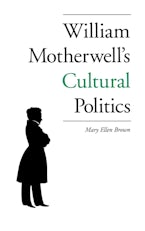William Motherwell (1797-1835), journalist, poet, man-of-letters, wit, civil servant, and outspoken conservative, published his anthology of ballads, Minstrelsy: Ancient and Modern, in 1827. His views on authenticity, editorial practice, the nature of oral transmission, and the importance of sung performance—acquired through field collecting—anticipate much later scholarly discourse.
Published after the death of Burns and the publication of Scott's Minstrelsy of the Scottish Border, ballads such as those Motherwell collected were one focus of a loose-knit movement that might be designated, cultural nationalism. This interest in preserving relics that suggested a distinctly Scottish culture and nation was one response to the union of the Scottish and English Parliaments in 1707. Mary Ellen Brown's study provides a model for historical ethnography, focusing on an individual and illustrating the multiple ways he was richly embedded in his time and place.

